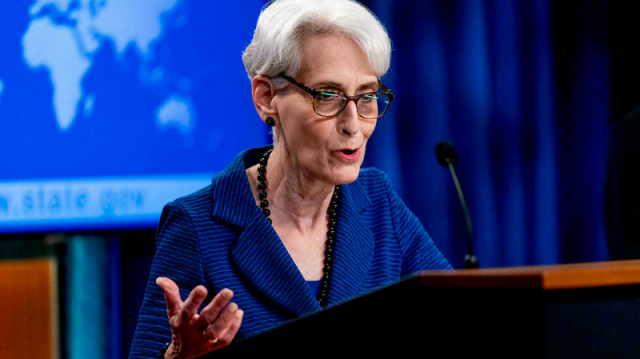US State Dept No 2 in Pakistan for crucial talks
Officials say Afghanistan to figure prominently during discussions

US State Department Deputy Secretary of State Wendy Sherman arrived in Islamabad on Thursday on a crucial visit, focusing on the current Afghan situation and the future of bilateral ties between Islamabad and Washington.
This is the first visit by a senior American diplomat under the US President Joe Biden administration though the CIA chief earlier undertook back-to-back trips that were primarily focused on certain developments inside Afghanistan.
However, the visit by Wendy is more significant as this will cover the whole gamut of the relationship between Pakistan and the US, according to official sources. The senior State Department official flew from New Delhi where she had wide-ranging engagements.
In Islamabad, she would meet all the relevant people both in the civil and military setup, sources stated. Officials familiar with the agenda of her visit said Afghanistan would certainly figure prominently during the discussions.
Meanwhile, Pakistan’s emphasis would be on broad-based ties covering bilateral issues, including trade and commercial ties between the two countries.
Pakistan has of late been advocating that ties with the US must not be transactional or security-based and Afghanistan driven. For this purpose, the Biden administration was conveyed that the US must not see Pakistan through the Indian or Chinese lens. “We want to develop bilateral cooperation purely based on the interests of both the countries,” said a senior Pakistani official.
However, the diplomatic sources said that much depends on the outcome of Afghanistan. The US wants Pakistan not to recognise the Taliban government before they fulfil the promises they made with the international community.
Also, the US officials feel that contrary to Pakistan’s claim of seeking transformation from geo-strategic to geo-economics, there has been little or no work done on the ground.
Read Blinken says US will assess Pakistan ties over Afghanistan's future
The western countries still have concerns over the ease of doing business in Pakistan as well as a poor track record of the country for not honouring the bilateral agreements.
President Biden has so far given a lukewarm response to Pakistan’s efforts seeking enhanced ties with the US. Biden has not yet spoken to Prime Minister Imran Khan, something that has become a talking point in both countries.
There is no clear explanation from the US side for ignoring PM Imran for so long, observers feel this only highlights the US' priorities in the region.
Washington considers New Delhi as a long term strategic partner and considers India as vital to counter China. But despite the deepening ties between the US and India, Pakistan is still important for Washington in the context of Afghanistan and counter-terrorism operations. The US wants to retain over the horizon capabilities in Afghanistan but it needs Pakistani air space.
Perhaps, it was because of this reason that the US military leadership was reluctant to publicly criticise Pakistan during the recent Congressional testimony on Afghanistan.
It is believed that despite an apparent hiccup in ties at the civil leadership level, the US and Pakistan still have a good working relationship as both understand each other’s importance in the regional security domain.
Speaking at a weekly news briefing, Foreign Office spokesperson Asim Iftikhar said the US Deputy Secretary of State's visit follows the recent meeting between the two foreign ministers in New York.
During the visit, views will be exchanged on all issues of mutual interest including the bilateral relationship as well as the regional situation, he added.
Iftikhar said close and regular engagement between Pakistan and the United States has always been mutually beneficial and a factor for stability in South Asia. "We look forward to reinforcing a balanced Pak-US relationship that is anchored in mutually beneficial cooperation in all areas, including security, trade, investment, energy and regional connectivity," he maintained.


















COMMENTS
Comments are moderated and generally will be posted if they are on-topic and not abusive.
For more information, please see our Comments FAQ